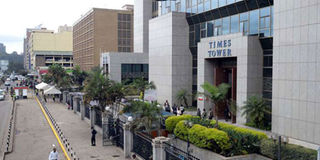Use KRA to fight corruption

Times Tower, the headquarters of the Kenya Revenue Authority, along Haile Selassie Avenue in Nairobi. PHOTO | SALATON NJAU | NATION MEDIA GROUP
What you need to know:
- Despite its sometimes infuriating systems, the KRA is one of the more efficient government agencies in Kenya, thanks to the reforms put in place by the Mwai Kibaki administration.
- With the new Tax Procedures Act in place and the recent ruling that illegal income is taxable, the KRA may just be best placed to slay the dragon.
- One need not be a psychic to know that most of the beneficiaries of corruption do not pay taxes on their loot. The penalties for tax evasion under the new Tax Procedures Act include fines of up to Sh10 million and/or imprisonment of up to 10 years.
- All the KRA needs to do is trace one of the beneficiaries of corruption and prosecute him for tax evasion.
- Human beings are innately self-preserving and few would turn down an offer to provide information on their co-conspirators if it meant no time or reduced time served as a guest of the State.
Charles Blazer, a former high-ranking official of football's global governing body Fifa, led a glamorous life. So glamorous, it is alleged he rented two apartments in New York; one for him and another at the cost of $6,000 (Sh608,000) a month for his cats.
This relatively unknown man, who bore an uncanny resemblance to Santa Claus, became the key to unravelling the corruption that pervaded Fifa.
As was the case with other well-known criminals, such as Al Capone, tax proved to be the key, because like most people who acquire income illegally, Blazer’s lifestyle did not match his tax returns. When the US tax authorities uncovered more than a decade worth of unpaid taxes on his hidden income, it used this bit of information to compel him to become an informant for them and the FBI.
Using the information he provided, the FBI was able to unearth extensive corruption within Fifa that included various levels of fraud ranging from payment of bribes to win hosting rights for the World Cup, to bribes related to various tournaments, as well as embezzlement of funds, among others.
The discovery led to reforms that saw Fifa president Sepp Blatter step down and other officials face criminal charges.
A recent survey by PwC found Kenya to be the third most corrupt country in the world. The headlines are awash with corruption scandals ranging from the NYS scandal to purchase of wheelbarrows at the inflated price of Sh109,000 each.
During his tenure as the National Treasury permanent secretary, Mr Joseph Kinyua shocked Kenyans when he revealed that at least one third of the Kenyan budget is lost annually to embezzlement.
Despite all the corruption-related prosecutions, there has not been any conviction—at least no high profile ones.
RUNAWAY CORRUPTION
Former Chief Justice Willy Mutunga lamented the runaway corruption in the country, calling Kenya a bandit economy.
Our commander-in-chief has even gone on record declaring corruption a threat to national security. If both the heads of the Executive and Judiciary are at a loss on how to slay this dragon, what hope have we?
Perhaps we can borrow a leaf from the Fifa scandal. It may be time for Kenya to consider transferring her faith in this corruption fight from the discredited and seemingly powerless EACC to the KRA.
Despite its sometimes infuriating systems, the KRA is one of the more efficient government agencies in Kenya, thanks to the reforms put in place by the Mwai Kibaki administration.
With the new Tax Procedures Act in place and the recent ruling that illegal income is taxable, the KRA may just be best placed to slay the dragon. One need not be a psychic to know that most of the beneficiaries of corruption do not pay taxes on their loot. The penalties for tax evasion under the new Tax Procedures Act include fines of up to Sh10 million and/or imprisonment of up to 10 years. All the KRA needs to do is trace one of the beneficiaries of corruption and prosecute him for tax evasion. Human beings are innately self-preserving and few would turn down an offer to provide information on their co-conspirators if it meant no time or reduced time served as a guest of the State.
And convictions for tax evasion may be much easier to secure than those of corruption since the Tax Procedures Act places the burden on the accused person to show that he did not evade tax.
Of course, the idea of using the KRA to fight corruption may seem too simplistic and even outlandish. And perhaps it is.
But we must start somewhere. Since constantly hounding anti-corruption commissioners and rebranding the EACC has remained largely unsuccessful, maybe a change of tact is what is needed. The best part about using the taxman to fight our war on corruption is that we may finally get to send some of these corrupt people to prison, if not for corruption, at least for tax evasion.
Catherine Mutava is associate tax director, Strathmore Tax Research Centre; [email protected].




